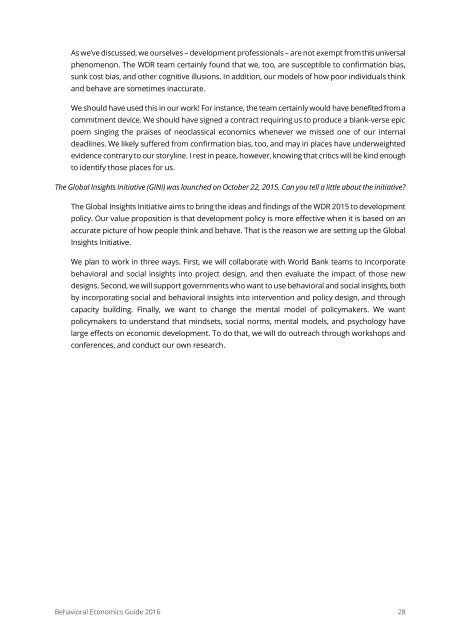THE BEHAVIORAL ECONOMICS GUIDE 2016
BEGuide2016
BEGuide2016
Create successful ePaper yourself
Turn your PDF publications into a flip-book with our unique Google optimized e-Paper software.
As we’ve discussed, we ourselves – development professionals – are not exempt from this universal<br />
phenomenon. The WDR team certainly found that we, too, are susceptible to confirmation bias,<br />
sunk cost bias, and other cognitive illusions. In addition, our models of how poor individuals think<br />
and behave are sometimes inaccurate.<br />
We should have used this in our work! For instance, the team certainly would have benefited from a<br />
commitment device. We should have signed a contract requiring us to produce a blank-verse epic<br />
poem singing the praises of neoclassical economics whenever we missed one of our internal<br />
deadlines. We likely suffered from confirmation bias, too, and may in places have underweighted<br />
evidence contrary to our storyline. I rest in peace, however, knowing that critics will be kind enough<br />
to identify those places for us.<br />
The Global Insights Initiative (GINI) was launched on October 22, 2015. Can you tell a little about the initiative?<br />
The Global Insights Initiative aims to bring the ideas and findings of the WDR 2015 to development<br />
policy. Our value proposition is that development policy is more effective when it is based on an<br />
accurate picture of how people think and behave. That is the reason we are setting up the Global<br />
Insights Initiative.<br />
We plan to work in three ways. First, we will collaborate with World Bank teams to incorporate<br />
behavioral and social insights into project design, and then evaluate the impact of those new<br />
designs. Second, we will support governments who want to use behavioral and social insights, both<br />
by incorporating social and behavioral insights into intervention and policy design, and through<br />
capacity building. Finally, we want to change the mental model of policymakers. We want<br />
policymakers to understand that mindsets, social norms, mental models, and psychology have<br />
large effects on economic development. To do that, we will do outreach through workshops and<br />
conferences, and conduct our own research.<br />
Behavioral Economics Guide <strong>2016</strong> 28


